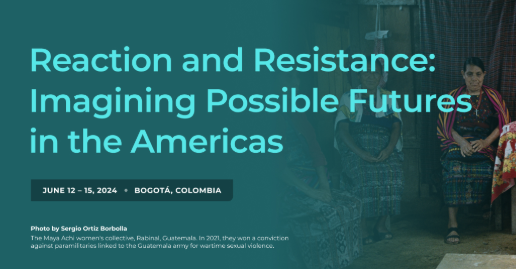“Engaging Affective Memory and Imagining Futures: ‘Tambadoras’ and Digital Tools for Afro-Colombian Cultural Preservation” at Maira C. Castro Mina, LASA 2024
In “Engaging Affective Memory and Imagining Futures: ‘Tambadoras’ and Digital Tools for Afro-Colombian Cultural Preservation,” Maira C. Castro Mina presented parts of her MA thesis focusing on a group of artisanal gold miners from the Colombian Cauca region, known locally as Tambadoras. In the presentation Maira discussed the role that Tamboras play in preserving Afro-Colombian cultural heritage through digital technologies in the panel “Affective Memory and Human Rights in Latin America: Reconstructing the Past, Imagining Futures” organized by Prof. Kim M. Beauchesne (University of British Columbia) and chaired by Alessandra S. Santos (University of British Columbia).
Abstract:
In the context of global devastating environmental effects of extractivist mining practices, we ask how Tambadoras contribute to collective remembering and forgetting, preservation of tradition and resistance at the intersection of debates over what is considered and safeguarded as intangible patrimony and the competing interests of artisanal and large-scale industrial mining practices in the Pacific region of the country. The history of Gold mining in Colombia is rich and complicated (Tubb 2020). Under the Colombian mining code (2001), the practice of Tamabdoras falls under the category of small alluvial mining practices, also known as barequeo, a manual process of washing sand to extract valuable metals, such as gold. Barequeo is a live, embodied, and affective tradition through which one generation’s skills, knowledge, and social representations are passed on to the next, serving as a guarantee for their material and cultural reproduction. Based in the town of Guachené, Tambadoras mine the Palo River and transmit their knowledge through a matrilineal line, offering a women-centred and sustainable community approach to gold extraction. Using collaborative research-creation methodologies, we explore the potential of diverse digital storytelling strategies, including video documentary, photography, and an interactive website, in disseminating their contributions to the preservation of Afro-Colombian heritage and the empowerment of Afro-Colombian communities in imagining more sustainable and culturally rich futures.
Mina Castro, Cristina and Aceves Sepúlveda, G. (2024). “Engaging Affective Memory and Imagining Futures: ‘Tambadoras’ and Digital Tools for Afro-Colombian Cultural Preservation” In The Latin American Studies Conference, LASA 2024, Bogotá, Colombia, June 12- 15, 2024. [Conference Presentation]

